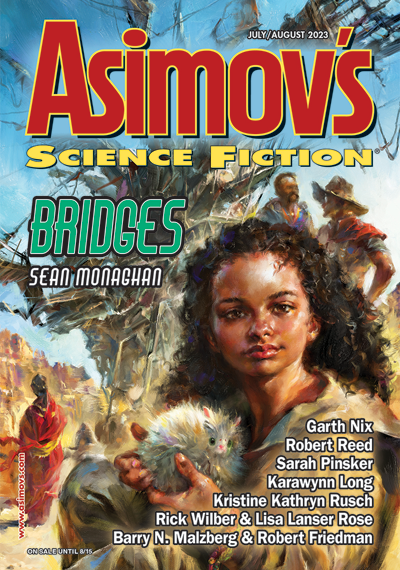News & Notes
A novel, a wedding, and some heavy petting
I’ve been trying to write at least one substantial Nine Lives essay per calendar month, but sometimes there’s just too much life happening. Only a week in, I can already tell August is going to be one of those months.
For one, I’ve been making a final editorial pass through my partner Jak’s new SF novel manuscript and helping him craft his agent query. Two, my elder stepdaughter is getting married, so Jak and I have a lot of traveling ahead this month — and a lot of preparation to do beforehand. And three, it’s been heavy petting season around here.
About six weeks ago, a terrified stray puppy turned up on our property. Jak and I had intended to be a cat-only household going forward, but once ‘another dog’ shifted from an abstract concept to a living, present animal in real need, well … we changed our minds.
Puppies, I have had cause to remember, are a crapton of work.
Then last week our oldest cat, Sammy, finally succumbed to cancer. He was the last of our three born-in-the-USA animals, more than twenty years old; we’d had him for sixteen and a half years. He had lifelong serious PTSD and anxiety disorders, and was also the sweetest-tempered cat I’ve ever known. He is much missed.

Library and publishing addenda
For those of you interested in the future of libraries and/or publishing (welcome to all the new subscribers![1]), a few follow-up points to my last article:
- Relevant to my assessment that the Big Five publishers are the keystone of libraries’ vampire capitalist problem comes this commentary from county public library director Michael Blackwell on the terms publishers offer libraries. It’s pretty grim, though I guess about what we should expect from any business whose entire top-level mandate is ‘make as much money as possible’. (One former library employee in my comments gave the example of paying $110 to lease a single digital copy of a prominent title for one year.)Blackwell also notes that OverDrive licenses from the Big Five at wholesale and then resells the licenses to libraries at full price, and that Palace (the nonprofit platform alternative I mentioned before) offers a wider and more favorable array of terms.
- A reader named Kat pointed me to this press release from last year that suggests that the Palace Project now has some kind of direct deal with all five major publishers and Amazon. Unspecified in this PR are 1) what percentage of the total catalog is available directly through Palace, and 2) does it include new titles and bestsellers, or only low-demand backlist? In other words, does OverDrive retain a monopoly over some important portion of the Big Five’s catalogs? If you’re a librarian who uses the Palace Project and you know the answers to those questions, I’d love it if you’d enlighten us in the comments.
- Over on Mastodon, another librarian referenced the pre-pandemic standoff between libraries and Macmillan as evidence of the extortionate position of the Big Five publishers (although they misremembered the dates of the boycott, which lasted 4.5 months before the pandemic, not 14).
In November 2019, Macmillan made a play to force library patrons to purchase personal copies of ebooks by embargoing new releases from libraries and raising the (already predatory) licensing fees for older books; libraries responded with an ebook boycott. Only the pandemic lockdowns in March 2020 forced Macmillan to back down … which is not a repeatable strategy. - The news that KKR is the frontrunner to buy Simon & Schuster in the wake of the government nixing the Penguin Random House purchase fills me with grim dread now that I understand exactly what KKR is. It’s Scylla or Charybdis: either HarperCollins wins the bid, and we still drop to ‘the Big Four’, or KKR wins, and Simon & Schuster will be run by vampire extractionists, possibly into the ground.Terrible news for authors — and publishing staff — either way. I’m kind of rooting for HarperCollins now, to be honest. At least their staff is unionized.
- Reader and librarian JD pointed me at this infographic showing the consolidation among companies providing library technologies, and adds that OverDrive “is not the only corporation exhibiting parasitism. Clarivate has been on an acquisitions frenzy. They’ve bought up ProQuest, a company that was on its own acquisition frenzy, and Innovative, effectively gobbling up the majority of integrated-library systems and discovery systems (the software that library catalogues and searches are built on). These corporate systems have seen very little change over the last decade or so but that hasn't kept the companies that sell them from asking for higher subscription fees every year.” You can read the rest of JD’s comment here.
- Elsewhere on the web, someone decided that my entire article was invalid because a web version of the Libby app exists. (See my exaggerated eyeroll.)
I did not know about web!Libby when I wrote the piece, because every time OverDrive redirected me to Libby, those links sent me to app downloads exclusively (even when I was on my desktop!) and never once even mentioned the web site option. This behavior only supports my suspicion that OverDrive is doing their best to push people to the Libby mobile apps, most likely for enhanced data-gathering, which it can then turn around and market to publishers. But regardless of whether I’m right or wrong about that, OverDrive is still obviously enshittifying Libby to suck even more out of library budgets.
Also, even web sites can collect vast amounts of data from anyone who doesn’t make a special effort to install and enable extra privacy protections — aka ‘most people’ — but if you must access Libby, you can thwart them to a large extent by ignoring the app and accessing the web version with a browser like Vivaldi and an extension like Privacy Badger.
Going, going, gone ...
One last reminder — this is the last week to get a copy of the July/August Asimov’s SF with my short story “Hope Is the Thing With Feathers” before the next issue comes out. It’s about a nonspeaking autistic person, some genetically-engineered corvids, and the right to self-determination. Available at indie genre bookstores, Barnes & Noble stores, newsstands, and in a digital version direct from the publisher.

I’ll be back in September — with puppy photos! In the meantime, let me recommend this poignant essay by my partner Jak about his father’s decline into dementia, which is very much in the Nine Lives spirit.
There are a lot of you! Which is amazing and awesome, but I seriously hope y’all checked out my archives before subscribing and so have some idea of what Nine Lives is all about.
Believe me, my imposter syndrome is getting along just fine; it does not need the additional fodder of you all unsubscribing again en masse when the next newsletter is not on the same topic as the one that brought you here. ↩︎